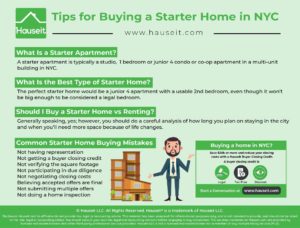Buying a starter home in NYC typically means purchasing a smaller condo or co-op apartment with up to one bedroom. The decision to do so should be taken only after careful analysis of the benefits of continuing to rent vs buying, as well as an analysis of potential future lifestyle changes. After the decision to buy is made, you’ll need to avoid a handful of common first time buyer mistakes which we’ll discuss in the last section of this article.
Table of Contents:
A starter apartment is typically a studio, 1 bedroom or junior 4 condo or co-op apartment in a multi-unit building in NYC. Due to high housing prices in the NYC real estate market, it’s typically impossible for the average first time home buyer to be able to afford anything larger, like a two or three bedroom apartment.
Furthermore, buying a starter home in NYC as a working professional means you’ll likely be financing and limited to a budget. This means you’ll most likely be purchasing a re-sale unit vs new construction, which typically costs more on a price per square foot basis.
For those on a shoestring budget, buying a starter home in NYC typically involves purchasing a small studio in a co-op building in a cheap part of town. For example, many parts of the Upper East Side and Yorkville have co-op buildings full of cheap studio apartments that make for great starter apartments.
Get a 2% Rebate When You Buy
Save thousands on your home purchase with a buyer agent commission rebate from Hauseit
What Is the Best Type of Starter Home?
The best starter home is one that is flexible and adaptable to your changing lifestyle needs. Ideally, it’ll have enough room for a baby crib if you have an unplanned pregnancy. And if you have an unplanned infant, your apartment better have a washer and dryer installed. Just imagine having to haul dirty diapers to the laundromat down the street instead!
If we had to choose, the perfect starter home would be a junior 4 apartment with a usable 2nd bedroom, even though it won’t be big enough to be considered a legal bedroom. Remember that junior 4 apartments are by default cheaper than true two bedroom apartments because the 2nd bedroom doesn’t meet the requirements for being a legal bedroom in NYC.







